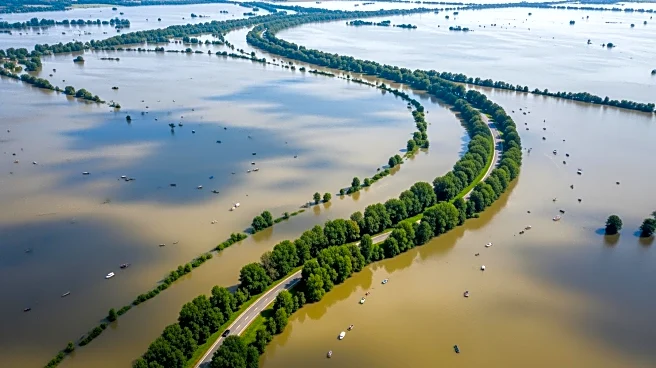What's Happening?
Vietnam is experiencing severe flooding in its central regions, resulting in the evacuation of approximately 61,000 people. The floods have caused significant disruption, with half a million residents
left without power. The government held an emergency meeting with leaders from four central provinces to address the crisis. Flash flood and landslide warnings have been issued for six provinces by the national weather agency. The flooding has particularly affected coffee-producing areas in the central highlands, delaying harvests in Dak Lak, the country's largest coffee-growing province. The region has been hit by 13 major storms this year, leading to substantial damage and loss of life. The Southeast Asian nation has seen rainfall levels significantly above historical averages, with forecasts predicting continued heavy rains through early December.
Why It's Important?
The flooding in Vietnam has significant implications for the country's economy and infrastructure. The coffee industry, a major economic sector, is facing delays in harvesting due to the extreme weather, potentially affecting global coffee supply as Vietnam is a leading producer of robusta beans. The widespread power outages and evacuations highlight the vulnerability of infrastructure to natural disasters. The situation underscores the need for improved disaster preparedness and response strategies. The ongoing La Niña weather pattern and negative phase of the Indian Ocean Dipole are contributing to the increased rainfall, indicating potential long-term climate challenges for the region.
What's Next?
Vietnam is likely to continue facing challenges as heavy rains are forecasted to persist. Authorities are working to reach isolated households and provide necessary aid. The government may need to implement more robust infrastructure and disaster management plans to mitigate future risks. International aid and support could be sought to assist in recovery efforts. The coffee industry will need to assess the impact on production and explore strategies to minimize losses. The situation may prompt discussions on climate change adaptation and resilience in Southeast Asia.
Beyond the Headlines
The flooding in Vietnam highlights broader environmental and climate issues affecting Southeast Asia. The region's susceptibility to extreme weather events may necessitate increased investment in climate resilience and sustainable development. The impact on agriculture and tourism sectors could lead to economic shifts and require diversification strategies. The situation also raises ethical considerations regarding the protection of vulnerable communities and equitable access to resources during disasters.









